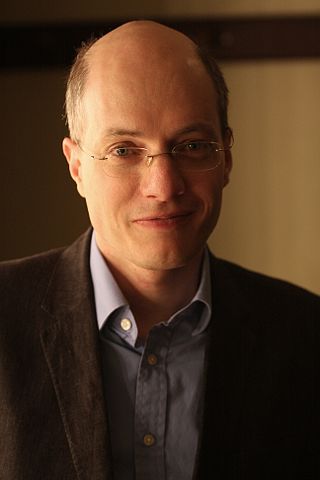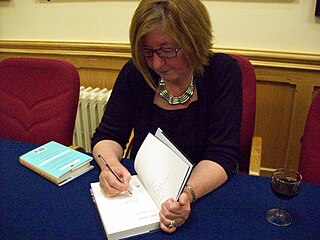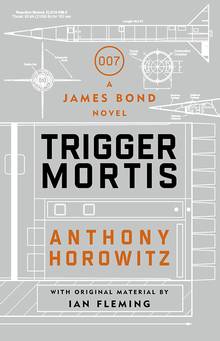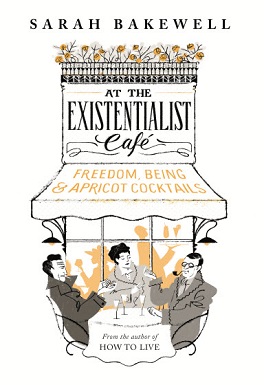
An essay is, generally, a piece of writing that gives the author's own argument, but the definition is vague, overlapping with those of a letter, a paper, an article, a pamphlet, and a short story. Essays have been sub-classified as formal and informal: formal essays are characterized by "serious purpose, dignity, logical organization, length," whereas the informal essay is characterized by "the personal element, humor, graceful style, rambling structure, unconventionality or novelty of theme," etc.

Michel Eyquem, Seigneur de Montaigne, commonly known as Michel de Montaigne, was one of the most significant philosophers of the French Renaissance. He is known for popularizing the essay as a literary genre. His work is noted for its merging of casual anecdotes and autobiography with intellectual insight. Montaigne had a direct influence on numerous Western writers; his massive volume Essais contains some of the most influential essays ever written.

Alain de Botton is a Swiss-born British author and public speaker. His books discuss various contemporary subjects and themes, emphasizing philosophy's relevance to everyday life. He published Essays in Love (1993), which went on to sell two million copies. Other bestsellers include How Proust Can Change Your Life (1997), Status Anxiety (2004), and The Architecture of Happiness (2006).

David James Pelzer is an American author of several autobiographical and self-help books. His 1995 memoir of childhood abuse, A Child Called "It": One Child's Courage to Survive, was listed on The New York Times Best Seller list for several years, and in 5 years had sold at least 1.6 million copies. The book brought Pelzer fame, and has also been a source of controversy, with accusations of several events being fabricated coming from both family members and journalists.

Patricia Mary W. Barker,, Hon FBA is an English writer and novelist. She has won many awards for her fiction, which centres on themes of memory, trauma, survival and recovery. She is known for her Regeneration Trilogy, published in the 1990s, and, more recently, a series of books set during the Trojan War, starting with The Silence of the Girls in 2018.

Barbara Ellen Kingsolver is a Pulitzer Prize-winning American novelist, essayist, and poet. Her widely known works include The Poisonwood Bible, the tale of a missionary family in the Congo, and Animal, Vegetable, Miracle, a nonfiction account of her family's attempts to eat locally. In 2023, she was awarded the Pulitzer Prize for Fiction for the novel Demon Copperhead. Her work often focuses on topics such as social justice, biodiversity, and the interaction between humans and their communities and environments.

Jenny Diski FRSL was an English writer. She had a troubled childhood, but was taken in and mentored by the novelist Doris Lessing; she lived in Lessing's house for four years. Diski was educated at University College London, and worked as a teacher during the 1970s and early 1980s.

Edith Jessie Thompson and Frederick Edward Francis Bywaters were a British couple executed for the murder of Thompson's husband Percy. Their case became a cause célèbre.

The Essays of Michel de Montaigne are contained in three books and 107 chapters of varying length. They were originally written in Middle French and published in the Kingdom of France. Montaigne's stated design in writing, publishing and revising the Essays over the period from approximately 1570 to 1592 was to record "some traits of my character and of my humours." The Essays were first published in 1580 and cover a wide range of topics.

Junot Díaz is a Dominican-American writer, creative writing professor at Massachusetts Institute of Technology, and a former fiction editor at Boston Review. He also serves on the board of advisers for Freedom University, a volunteer organization in Georgia that provides post-secondary instruction to undocumented immigrants. Central to Díaz's work is the immigrant experience, particularly the Latino immigrant experience.

Jeanne de Lestonnac, ODN, also known as Joan of Lestonnac, was a French Catholic nun who founded the Sisters of the Company of Mary, Our Lady in 1607. The institute, approved by Pope Paul V in 1607, was the first religious order of women-teachers approved by the Catholic Church.
Adam Thorpe is a British poet and novelist whose works also include short stories, translations, radio dramas and documentaries. He is a frequent contributor of reviews and articles to various newspapers, journals and magazines, including the Guardian, the Poetry Review and the Times Literary Supplement.

Beatrice Dorothy "Bee" Wilson is a British food writer and journalist. She writes the "Table Talk" column for The Wall Street Journal, and is also a campaigner for food education through the charity TastEd.

Going Rogue: An American Life (2009) is a memoir by politician Sarah Palin, former governor of Alaska and 2008 Republican candidate for U.S. Vice President on the ticket with Senator John McCain. She wrote it with journalist Lynn Vincent.
Michael Perry is an American author, born and raised in New Auburn, Wisconsin.

Hitch-22: A Memoir is a memoir written by author and journalist Christopher Hitchens.

There But For The is a 2011 novel by Scottish author Ali Smith, first published in the UK by Hamish Hamilton and in the US by Pantheon, and set in 2009 and 2010 in Greenwich, London. It was cited by both The Guardian book review and the Publishers Weekly as one of the best books of the year. and was also longlisted for the 2012 Orange Prize for Fiction.

Sarah Bakewell is a British author and professor. She lives in London. She received the Windham–Campbell Literature Prize in Non-Fiction.

Trigger Mortis is a 2015 James Bond novel written by Anthony Horowitz, and commissioned by the estate of Bond's creator Ian Fleming, which was published on 8 September 2015.

At the Existentialist Café: Freedom, Being, and Apricot Cocktails is a 2016 book written by Sarah Bakewell that covers the philosophy and history of the 20th century movement existentialism. The book provides an account of the modern day existentialists who came into their own before and during the Second World War. The book discusses the ideas of the phenomenologist Edmund Husserl, and how his teaching influenced the rise of existentialism through the likes of Martin Heidegger, Jean Paul Sartre, Simone De Beauvoir, who are the main protagonists of the book. The title refers to an incident in which Sartre's close friend and fellow philosopher Raymond Aron startled him when they were in a cafe, by pointing to the glass in front of him and stating, "You can make a philosophy out of this cocktail."

















